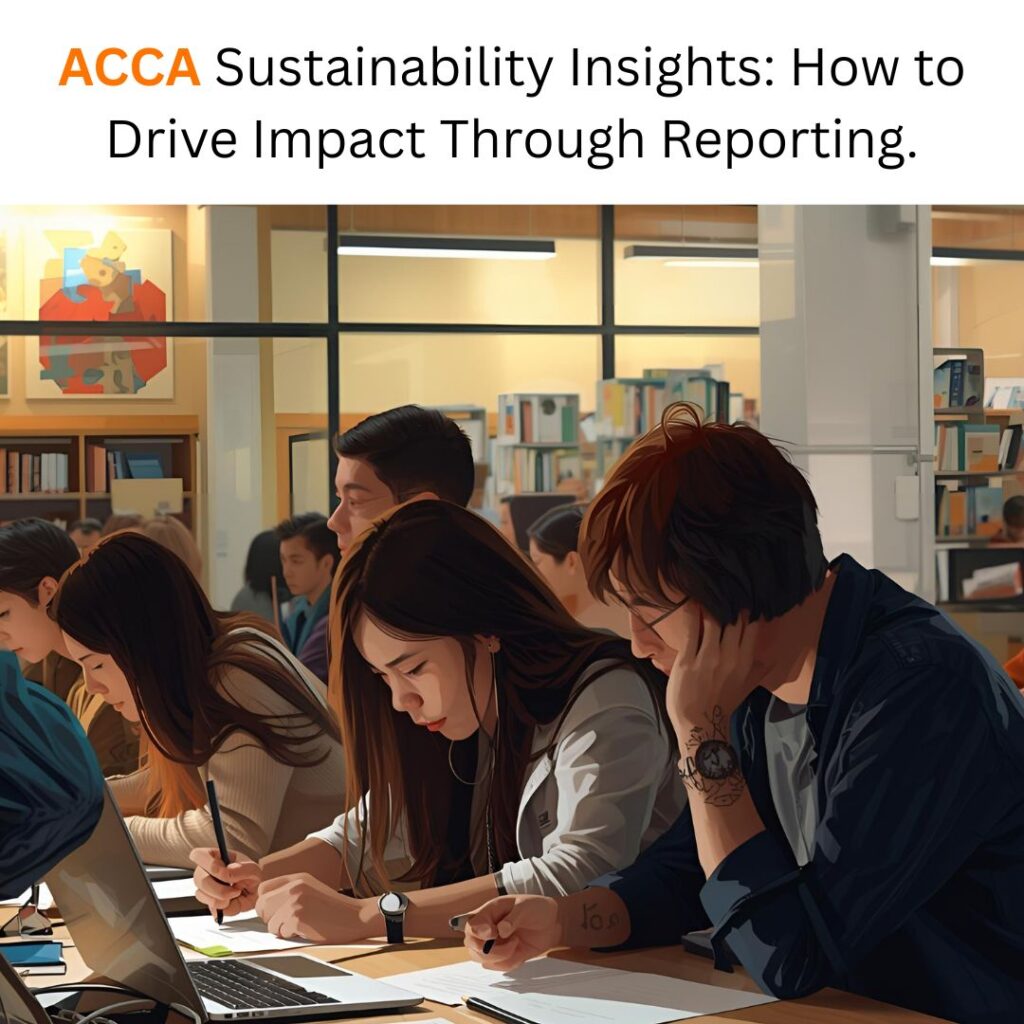INTRODUCTION:
ACCA Sustainability reporting has become a requirement of the financial industries around the globe as businesses are becoming sustainable and following ESG factors. This change in business landscape demands a transformation in the financial world as well to efficiently report and present the sustainable growth measures taken by an organization to the stakeholders. Professionals are now required to be proficient in green accounting or sustainable reporting to stay competent in the industry and serve their practical-world role with proficiency.
As this change is quite popular in the global financial industries, the ACCA qualification in Mauritius couldn’t help but focus on ACCA sustainability reporting through its perfectly tailored academic curriculum. ACCA professionals are still on the brighter side as they get a chance to stay competitive in the job market with the advanced, insightful modules that cover such essential areas comprehensively and equip aspirants with relevant skills.
ACCA sustainability reporting is applauded by employers as this allows aspirants to make better internal decisions, encourages sustainable finance investments, gains stakeholders’ trust, and promises efficiency gains, etc. Want to explore more ACCA sustainability insights comprehensively? Read the blog ahead to get all the information.
ACCA’s CURRENT VIEW ON SUSTAINABILITY REPORTING:
ACCA views sustainability reporting not as an optional skill but as a core part of the qualification, as businesses demand professionals who can add value to the business by managing risks, building trust, and creating long-term value through sustainable reporting globally. ACCA sustainability focuses on training students to connect sustainable efforts to the financial information that enables them to give stakeholders comprehensive insights. Other than that, it also concentrates on the fact that the report must be reliable, transparent, useful, and focused on the interests of the stakeholders.
ACCA SUSTAINABILITY FRAMEWORKS:
One of the well-focused tools to ensure sustainable reporting in an organization, offered by ACCA, is the Eight-Stage Sustainability Reporting. The breakdown of these stages is as follows:
Stage 1: Governance, Accountability, and Responsibility.
Stage 2: Identifying Material Sustainability-related matters.
Stage 3: Setting Strategy and Targets.
Stage 4: Data collection and management.
Stage 5: Analysis, metrics, and measurement.
Stage 6: Reporting or Communicating.
Stage 7: Verification and Assurance.
Stage 8: Review and Continuous Improvement.
These were certain stages followed for ACCA sustainability reporting; these tools have been quite effective and helped professionals perform to the best of their abilities.

today!
HOW TO DRIVE IMPACT THROUGH REPORTING:
The best thing about ACCA sustainability reporting is that, rather than just outlining what to do, it also focuses on how to do it effectively. The reporting skills and techniques ACCA provides help make a real impact and are valued in the practical world efficiently.
Here are some actions that ACCA suggests for organizations to ensure effective reporting tasks:
1: Set a sustainability-led culture and focus on risk management:
Professionals are advised not to just focus on sustainable reporting but also to integrate sustainable opportunities and risks into business operations, strategies, and effective decision-making. The execution part of this strategy has to be played very well by those in leadership and governance roles.
2: Collaborate across departments:
Sustainability is not only concerned with the financial department of an organization, but it touches all the departments, such as Operations, HR, Risk and Compliance, etc. Hence, to ensure accuracy, consistency, and relevance, all the departments need to work effectively together to provide sustainable financial statements.
3: Effective use of technology:
ACCA sustainability reporting suggests leveraging technology and advanced digital financing systems for tracking and collecting data; this ensures error-free data, real-time monitoring, and avoids duplication.
4: Stakeholder focus:
According to what ACCA sustainability reporting suggests, the reports must be transparent and honest; nothing in these reports should be misinterpreted or greenwashed. The reports should be created with a stakeholder focus and should serve their interests to build an organization’s image and stakeholder trust.
CHALLENGES AND RISKS OF ACCA SUSTAINABILITY REPORTING:
However, sustainability measures are beneficial for economic, social, and cultural well-being, but there are certain obstacles that finance professionals have to face to execute their roles and responsibilities efficiently.
- Lack of good-quality, efficient data.
- Inability to connect sustainability with financial practices.
- Insufficient skillset in finance professionals.
- Risk of greenwashing and intransparency.
- Uncertainties of regulations might create unseen complexities.
HOW IMPACT IS DELIVERED THROUGH ACCA SUSTAINABILITY REPORTING:
ACCA sustainability reporting is quite impactful if done the correct way; efficient reporting helps generate positive and long-term outcomes, some of which are discussed below:
- ACCA sustainability reporting ensures better internal decisions are being made.
- Helps gain stakeholder trust, which results in greater investments globally.
- Improved strategic resilience when it comes to dealing with climatic risks, regulatory changes, etc.
- Ability to do better alignment with social, economic, and environmental factors while managing business profitability.
CONCLUSION:
ACCA Sustainability Reporting has played a major role in producing skilled finance professionals who are committed to ensuring sustainable accounting practices are being performed. The ACCA curriculum equips aspirants with multiple tools and techniques that help them in sustainable reporting that is fraud-free, accurate, and comprehensible. Through these techniques, professionals can win investors’ and stakeholders’ trust, resulting in business profitability and growth. ACCA sustainability reporting highlights effective ways to drive positive impact, such as collaboration across departments, effective use of digital technologies, and a high focus on risk management etc.
FREQUENTLY ASKED QUESTIONS:
Q1: What are the important sustainability reporting frameworks according to ACCA?
Answer: Effective frameworks for sustainability reporting, according to ACCA’s guide, include GRI standards, IFRS sustainability disclosure standards, etc.
Q2: What essential resources and tools does ACCA offer to equip aspirants with sustainable reporting standards?
Answer: Essential resources offered by ACCA include relevant videos & workshops, ‘Mastering sustainability reporting’ course, sustainability reporting guide and preparation, etc.
Q3: Why is ACCA so focused on sustainability reporting and green accounting?
Answer: ACCA remains exceptionally focused on green accounting and sustainable reporting as it is the demand of the modern financial world; employers seek professionals with skills and proficiency in these areas.





